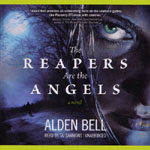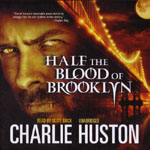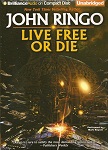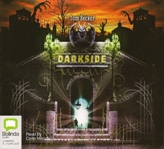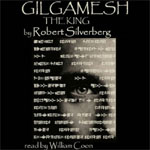
 The Blade Itself (The First Law: Book One)
The Blade Itself (The First Law: Book One)
By Joe Abercrombie; Read by Steven Pacey
Audible Download – 22 Hours 18 Minutes [UNABRIDGED]
Publisher: Orion Publishing Group
Published: 2010
ISBN: 9781409111443
Provider: Audible.com
Sample |MP3|
Themes: / Fantasy / Sword and Sorcery / Dark Humor / Revenge / Violence /
For a couple years now, Joe Abercrombie’s The First Law Trilogy has been at the top of my to-read list, but as I’m a slow print reader, the series inevitably yielded to more readily available audiobooks. Imagine my delight, then, when I recently realized that Orion Publishing Group had published the series in audio last June. The wait was worth it. The opening volume, The Blade Itself is a darkly humorous tale full of antiheroes and intrigue. Abercrombie’s strong writing and wry wit set The Blade Itself a cut above other novels in the reactionary subgenre of fantasy spawned by George R.R. Martin.
At first blush, the world of the First Law Trilogy looks like your average fantasy world. The bulk of the action takes place in Adua, capital city of The Union, a land with a dotard king facing imminent war on two fronts: the newly-unified North and the Gurkish Empire to the South. The city, and especially its central citadel the Agriont, is teaming with ambitious councilman, posturing soldiers, and brutal inquisitors. The North, as one might epect, is a sparse unwelcoming land peopled by warrior clans recently unified under the iron fist of King Bethod. In The Blade Itself we see only snatches of the Gurkish Empire, but it follows the usual desert formula for southern kingdoms. (Why do most fantasy series seem to be set in the Northern hemisphere?) This opening volume hints at an intricate magic system that underlies and informs the world, but so far it’s rather underdeveloped.
The viewpoint characters bring this seemingly run-of-the-mill fantasy world to life in vibrant color. Each character is an antihero, in some sense of the word. Like George R. R. Martin, Richard K. Morgan, and other recent writers, Abercrombie is writing against the tropes of the traditional good-versus-evil format of epic fantasy. Unlike some other writers in this vein, though, Abercrombie rarely seems too self-conscious about what he’s doing. Logen Ninefingers, dubbed the “bloody-nine” in the North, does not read like an anti-Aragorn, nor does Bayaz, First of the Magi, read like an anti-Gandalf. Rather, they’re fully developed characters in their own right. Then there’s San dan Glokta, survivor of a horrible ordeal of torture at the hands of the Gurkish Empire who has in turn become a torturer for the inquisition. Rounding out the cast is Jezal, a headstrong noble youth determined to win the year’s fencing contest. With the exception of Jezal, these characters have endured tremendously hard lives, so naturally their thoughts aren’t filled with sunshine and butterflies. This is a dark book.
The fun lies in watching these characters come together and interact with one another. As in any good book, too, it’s fun to watch these characters, who we’ve come to empathize with even if we don’t actually like them, overcome their internal and external challenges. The most obvious case is Jezal and his fencing contest, which is brought to a most satisfying concentration. Then there’s Glokta, trying to stay afloat in the political post of Inquisitor, all while struggling merely to get out of bed. Then there’s Logen, fleeing his reputation as the “bloody-nine.” And at the heart of it all is Bayaz, First of the Magi, whose story hints at the direction the series may ultimately take. Bayaz, though not a point-of-view character, drives the plot in many ways, either subtly or overtly manipulating events to suit his needs.
If the book has a weakness, it’s the ending. Endings are always tricky things to pull off, especially in the first novel of a trilogy, where an author must bring the present volume to a satisfying conclusion while enticing the reader to continue with the series. Unfortunately, Abercrombie leans too far towards the latter. While the last hour or two of audio will be a treat for fans of vividly-depicted action sequences, they’re light on any satisfying story development. The ending certainly isn’t bad, it just left me a bit disappointed. On the other hand, it also did its job in whetting my appetite for the next volume.
As alluded to earlier, the standout character in The Blade Itself is perhaps Abercrombie’s deft writing style. Admittedly, it took some getting used to. I remember complaining on Twitter back when I first had a go at reading the print edition that the book was too full of sentence fragments and “said bookisms.” I stand by that complaint. The thing is, the style really fits the world and especially the characters. The dialogue reads like you’re sitting in on the conversation, especially under the standout narration by Steven Pacey. And while I’m not personally a fan of long action sequences, there’s no doubt that Abercrombie writes them masterfully. You can feel every bone-jarring sword blow and taste the tang of blood in the air.
I approached this audiobook with some hesitation. I feared that no narrator could match Michael Page’s performance of Abercrombie’s Best Served Cold. At best, I feared, I’d be disappointed; at worst, I wouldn’t even be able to listen to the book in its entirety. Fortunately, Steven Pacey is equal to the task of narrating such an ambitious work. His narration walks the fine balance of capturing the characters’ voices–literally and figuratively–without calling too much attention to them and thereby detracting from the story. The toothless Glokta, for instance, speaks with just a hint of a lisp, a slight slurring. Every now and then, his narration moves a touch too far toward the dramatic, but for the most part it’s spot on.
The Blade Itself, if it were a film, would carry a solid R rating, and therefore isn’t for everyone. Strong language and violence abound. Under its dark veneer of brutality, however, the novel shines with complex characters, compelling writing, and a story that, though not yet fully baked, promises to yield great rewards in subsequent novels.
Posted by Seth Wilson

 In his 1977 essay introduction to The Best Of Raymond Z. Gallun, entitled Raymond Z. Gallun, The Quiet Revolutionary, John J. Pierce wrote:
In his 1977 essay introduction to The Best Of Raymond Z. Gallun, entitled Raymond Z. Gallun, The Quiet Revolutionary, John J. Pierce wrote: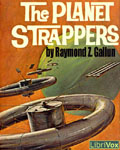 The Planet Strappers
The Planet Strappers

